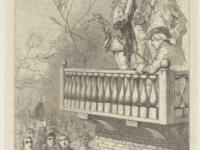During the Revolutionary War, the newly created American government not only lacked a constitution but the whole country lacked a bank. War is an expensive undertaking, and some of the prominent Founding Fathers, including the controversial financier Robert Morris, determined that Washington’s army (and the Revolutionary effort in general) could benefit from the services of a bank, leading to the creation of the Bank of North America. This bank, due to the fact that a large portion of its original shares were held by the fledgling government, was briefly the de facto national bank of the United States, but shortly thereafter continued its existence in private hands.
Students, particularly those who need to complete a Document Based Question, or those students looking for a research paper topic related to the Revolutionary War, or early economic policies of the United States, will be interested in these documents. They have been compiled in order to allow critical analysis of many formative historic, government, and economic questions.

